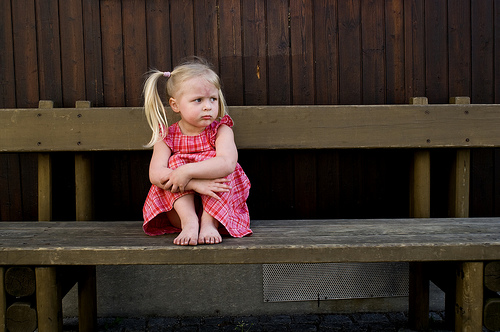How often do our kids parrot back words that make us cringe? While your two-year-old blurting out “I need coffee!” in the supermarket or using salty language with relatives may get laughs in the retelling, other phrases will break your heart.
Phrases like, “I’m stupid.”
“I’ll never be good at anything.”


Before you demand from your kid, “who told you that?” ask yourself this: have you said these words? I plead guilty to the above phrases — and worse.
You’re not alone. Negative self-talk and low self-esteem plague many ADHD adults. But when it comes to our behavior around our children, it has to stop.
Think about it this way: ADHD is a highly heritable disorder. If your child doesn’t already have a diagnosis, he very well may by adulthood. When you say “I’ll never reach my full potential,” or “I don’t know why I even try,” you’re giving your kid a big lesson about his outlook for the future.
Outlook is important. If your child does have ADHD, he’ll need to be confident and resilient in the face of life’s frustrations. Your child is watching — and learning — every time you berate yourself for screwing up. Eventually, she’ll learn to respond to setbacks by focusing on weaknesses rather than working from her strengths.
That’s not to say your feelings aren’t valid. But though you may feel like a terrible parent and irresponsible adult after a rough day, your kids aren’t harsh critics. They want to be just like Mommy or Daddy. When you insult yourself, you’re not only setting a terrible example for handling frustration, you’re questioning their judgement. You’re telling them they picked the wrong role model.
For better or worse, our kids idolize us. When we put ourselves down, we imply they’re poor judges of character. We teach them damaging, ineffective ways to recover from failures. We teach them that an individual’s flaws are more important than her innate talents and strengths, and our mistakes are more memorable than our successes.
We also teach them that having ADHD makes us less valuable human beings. Our neurochemistry will hold us back from making a significant contribution to the world. We’re doomed to disappoint the people we love the most, make bad first impressions, and lose our keys over and over again.
When we look at our brilliant, uniquely lovable children, this isn’t who we want them to become.
Don’t fool yourself into thinking they’ll teach themselves resiliency and self-respect. They learn it from the most important role model they’ll ever have: you.
Next time you catch yourself about to express even the mildest self-loathing, ask yourself if you’d want to see your child treat himself — or his best friend — that way.
If the answer is no, it’s a habit you need to break.
Hey there! Are you enjoying The ADHD Homestead?
Here's the thing: I don't like ads. I don't want to sell your attention to an advertising service run by the world's biggest data mining company. I also value my integrity and my readers' trust above all, which means I accept very few sponsorships/partnerships.
So I'm asking for your support directly. For the cost of one cup of coffee, you can help keep this site unbiased and ad-free.
Below you will find two buttons. The first lets you join our crew of Patreon pals and pledge monthly support for my work. Patrons also have access to my Audioblogs podcast. The second takes you to a simple donation page to pledge one-time or recurring support for The ADHD Homestead, no frills, no strings. Do whichever feels best for you!

